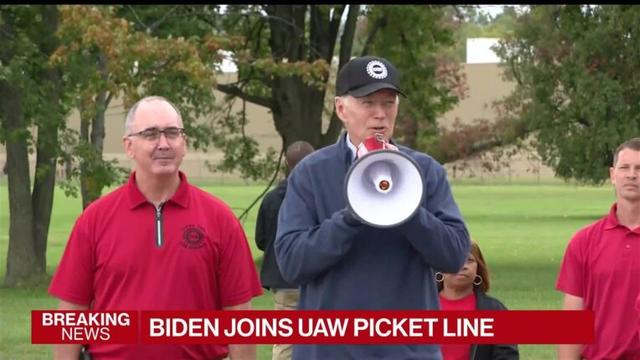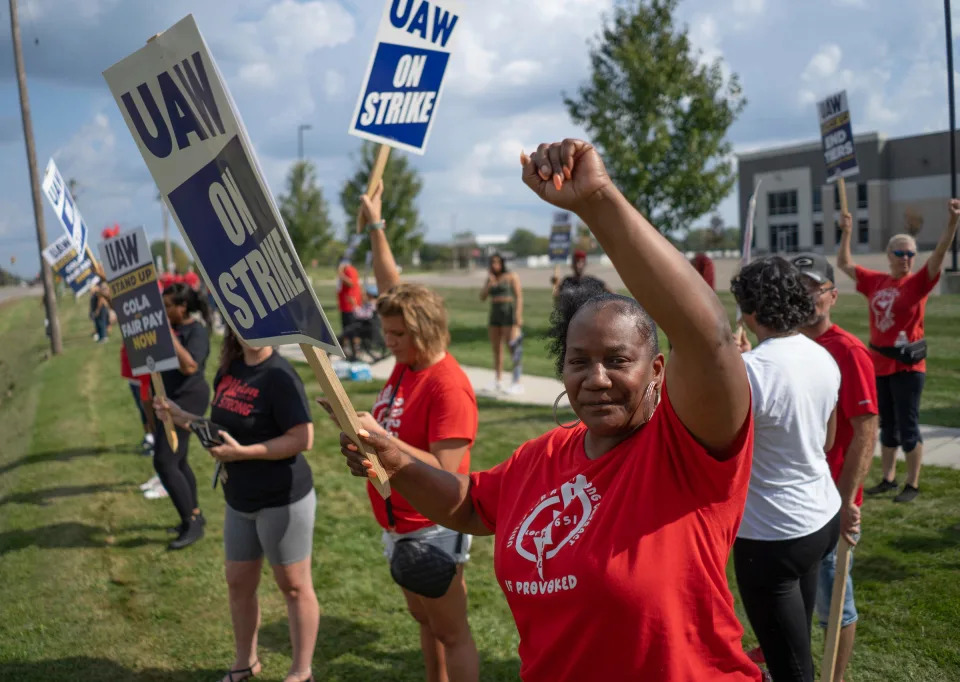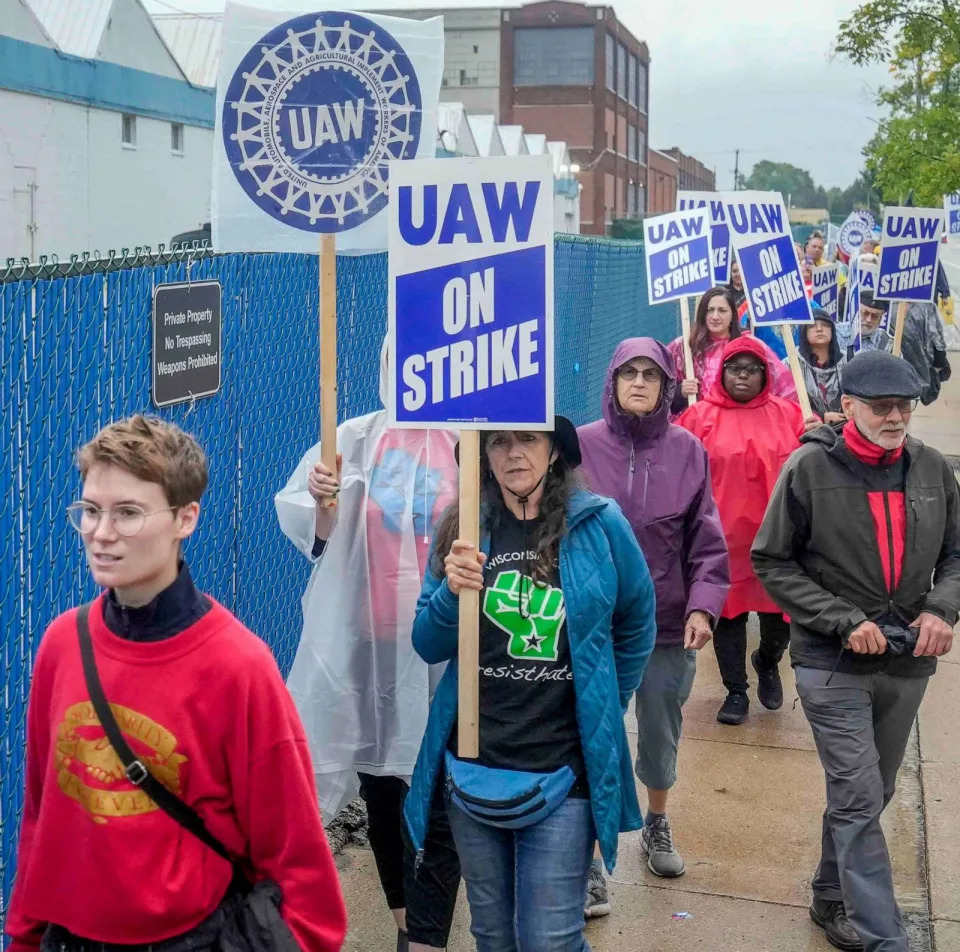MAX ZAHN
Fri, September 29, 2023
Tens of thousands of striking employees at the Big 3 automakers are receiving $500 a week in substitute pay from the United Auto Workers -- roughly half of their previous income.
Some workers will need to draw on savings or support from family members within weeks while cutting back on expenses like dental work and streaming services, according to interviews with two UAW members employed by Ford.
The financial pain endured by striking autoworkers comes alongside business losses incurred by diminished production at the Big 3 -- General Motors, Ford and Stellantis, which owns Jeep and Chrysler.
A 10-day strike among the 143,000 autoworkers represented by the UAW was expected to cost the companies a total of nearly $1 billion and to deny workers about $860 million in lost wages, according to a report released last month by the Anderson Economic Group.
As of Friday, the work stoppage had stretched for more than two weeks, though it had so far touched only a fraction of the workers and company facilities.
MORE: Soaring CEO pay commands spotlight in UAW strike against Big 3 US automakers
"The strike is the nuclear option," Art Wheaton, a labor professor at the Worker Institute at Cornell University, told ABC News. "This is mutually assured destruction."
"The workers want to withstand the strike one day longer than the companies so that they'll make a deal," Wheaton added.
Autoworkers have walked off the job at one assembly plant associated with each of the Big 3, as well as 38 parts distribution locations run by GM and Stellantis.
In all, roughly 18,300 autoworkers have walked out on strike, encompassing a fraction of the nearly 150,000 workers represented by the UAW in the contract dispute. UAW President Shawn Fain has said the strike will expand to include more workers if negotiations stall at the bargaining table.
In a statement on Thursday, a Ford spokesperson said the company remains engaged in talks with the UAW.
"Negotiations continue. Our focus remains on working diligently with the UAW to reach a deal that rewards our workforce and enables Ford to invest in a vibrant and growing future," the spokesperson said.
A spokesperson for General Motors criticized the union's decision to expand the strike, saying the company has put forward a series of "historic" contract proposals.
"The strike escalation last week by the UAW's top leadership was unnecessary," the spokesperson said. "We have said repeatedly that nobody wins in a strike and that effects go well beyond our employees on the plant floor and negatively impact our customers, suppliers and the communities where we do business."
Stellantis declined to respond to ABC News' request for comment. On Thursday, a spokesperson for Stellantis said in a statement: "We continue to approach these negotiations responsibly and bargain in good faith."
The UAW did not immediately respond to ABC News' request for comment.
Mack Hall, a striking Ford employee at an assembly plant in Wayne, Michigan, said he prepared financially in recent months by stashing away some of each paycheck and avoiding major expenses such as a vacation or new vehicle.
"I'm willing to make that sacrifice," Hall said, saying that he stands to bring in roughly half of his previous weekly income.
The experience reminds him of the pay cut that he and other autoworkers took as carmakers struggled during the Great Recession. "We've been sacrificing since 2012," he said.
In addition to the weekly $500 payment, the union's strike fund will provide reimbursement for health care costs. Since vision and dental costs will not be covered, Hall went in for a teeth cleaning and crown before the work stoppage began, he said.
"That's the last thing I did," he said, adding that his savings will last him four months before he goes into debt.
The targeted strike strategy allows the UAW to "create chaos" for the automakers, since they don't know where the strike will take hold next, Wheaton said. But the move also helps the union preserve its strike fund, he noted.
The union held $825 million in its strike fund before workers joined the picket line, allowing it to carry out a work stoppage among all of the workers that it represents at the Big 3 automakers for about 12 weeks, according to analysts at Evercore ISI. By narrowing the strike, the union can draw down the fund over a longer period of time.
The union has demanded a 40% pay increase combined over the four-year duration of a new contract, as well as a 32-hour workweek at 40-hour pay, among other terms.
The Big 3 automakers have offered a 20% raise and have appeared to reject the stipulation on the length of the workweek.
Marisa Beck, a Ford employee whose plant remains in operation, said she worries about the financial blow if the union were to call her out on strike. A single parent of a 10-year old child, Beck said the union stipend would cut her pay by nearly half.
"It's pretty stressful, particularly being the only income in the house, to think that you're going to be on strike and make way less," Beck said.
To prepare, Beck has cut expenses like some video streaming subscriptions and the regular purchase of a 5-gallon water cooler. "My daughter wanted the water cooler back," Beck said. "There's nothing wrong with tap water."
Still, Beck lacks enough savings to withstand the potential cut in pay, saying she would immediately need to rely on support from family members. Even so, Beck wouldn't hesitate if the union called her out on strike, she added.
"We've got buttons that say, 'I don't want to strike but I will,'" Beck said. "You really couldn't sum it up any better."
'Stressful': Striking autoworkers living on $500 a week from UAW originally appeared on abcnews.go.com
David Welch, Keith Naughton and Gabrielle Coppola
Thu, September 28, 2023

(Bloomberg) -- The United Auto Workers union wants to emerge from its strike against Detroit’s three major automakers with at least a 30% pay raise, according to people familiar with the matter.
That’s the level — which is lower than the around 40% hike it initially proposed to Ford Motor Co., General Motors Co. and Stellantis NV — that the union believes will allow it to satisfy existing members and organize non-union plants. It takes into account a cost-of-living allowance, or COLA, and a general wage increase, according to the people, who asked not to be named because the talks are private.
Automaker stocks were buoyed by the news. GM and Stellantis’ US shares each gained 2.5% on Thursday, while Ford rose 1.4%. GM and Ford have seen steep declines since July amid uncertainty about the negotiations. Stellantis is the outlier, up 36% so far this year.
A wage bump of at least 30% is expected to generate interest from non-unionized auto workers and help grow the union’s membership, according to the people.
The union’s president, Shawn Fain, is on a mission to expand the UAW by organizing future electric-vehicle battery plants and by targeting workers at Tesla Inc. and the US plants of Asian and European automakers, two people said. Its membership has fallen to 400,000 from more than 1 million in the 1970s.
A UAW spokesperson declined to comment. GM, Ford and Stellantis also declined to comment.
Ford has already offered a 20% pay increase, plus COLA payments on top of it. The UAW also had lowered its demand for pay raises to 36%. If the COLA formula gives workers additional raises, it represents a smaller gap between the two sides on pay. A UAW source said the union submitted a counterproposal to Stellantis on Thursday.
Read More: UAW Offers Slightly Lower Raise Demand to Detroit Automakers
The wage increase is part of a complex puzzle that also includes how much the automakers will invest in their factories to secure jobs for the UAW. Other issues include compensation for workers at future battery plants and retiree benefits, including the union’s demand for a return to traditional pensions. Each piece has to be agreeable to all parties or the deal will fall apart.
The UAW has been striking the automakers since Sept. 15, the first time it has targeted all three simultaneously. Fain is threatening to widen the strike on Friday if the companies don’t show progress at the bargaining table.
Fain already had workers walk out at 38 GM and Stellantis parts distribution facilities last week, saying that there was too little progress in talks.
©2023 Bloomberg L.P.
UAW talks active as jitters are felt inside some plants on day 14 of strike
Thu, September 28, 2023
On day 14 of the United Auto Workers strike against the Detroit Three, UAW leaders met with Stellantis, parent company of Chrysler, Dodge, Jeep, Ram and Fiat, according to two sources.
The midmorning meeting with Stellantis followed a late-afternoon meeting Wednesday at General Motors where GM leadership met with UAW President Shawn Fain. GM CEO Mary Barra was not at that meeting, the two people said. The people asked to not be named because they are not permitted to speak publicly about the matter.

As the Detroit Free Press reported earlier this week, the union and Ford had active talks through last weekend, but there were some key issues remaining.
"There's been a lot of activity in the last 24 hours," one of the people familiar with the talks said Thursday. The person characterized it as "active conversations across all three companies."
Fain is still scheduled to give a Facebook Live update on the state of negotiations at 10 a.m. Friday when he could name additional strike targets if substantial progress has not been made with the automakers.
Currently, there are about 18,300 UAW members across the Detroit Three at 41 facilities in 21 states on strike, and nerves are high at some plants as to whether they will be called next to walk out, some workers said.
"People are just ready," said Tommy Wolikow, a worker at GM's Flint Assembly plant, where GM builds its highly profitable heavy-duty pickups. "We’re eager to get a contract agreed upon, but at the same time, we’re ready to react if need be. We’re waiting for Shawn Fain to give us the information and give us the word to strike if we have to."
Another worker at a different GM plant told the Free Press people are "tense" and have a fear of the unknown. They don't know when they will be called to strike or if there will be a deal. The person, who is not being named to protect their job security, also feels guilty that others are living on $500-a-week strike pay while they are still collecting pay for working.
"We feel (Fain's) doing his best, but we have brothers and sisters out there and it’s going on two weeks now and we’re not joining them in solidarity," the worker said. "They’re taking the brunt of this and we’re not.”
Meanwhile, some 3,500 UAW members who work at Mack Trucks plants in Pennsylvania, Florida and Maryland might be joining the other strikes across the nation. Their contract expires Sunday. In a UAW update Thursday posted on X (formerly called Twitter), Fain called the negotiations "painfully slow" and saying Mack rejected job security proposals, 401(k) increases, pensions for all and a cost-of-living adjustment, among other things.
In response, Mack posted a bargaining update on www.macktrucks.com disagreeing with Fain's characterization.
"The bargaining teams have successfully reached tentative agreements on all 11 local contracts," Mack's update read. "Master Contract-level discussions are ongoing on a variety of economic, non-economic, and benefits issues. While it is true that the parties are currently far apart on the economics, this is not unusual at this point in the negotiations, and we expect progress in the coming days."

No comments:
Post a Comment